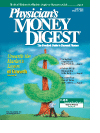Publication
Article
Physician's Money Digest
Time to Unload Your Financial Advisor?
Author(s):
With the stock market logging its third consecutive year of negative returns in 2002 and physician-investors watching their portfolios shrinking even further, many are reevaluating and considering using a different advisor. That decision really should be based on whether you have been getting good advice or not.
JUDGE IN RELATIVE TERMS
You can't simply look at the level of your return (ie, positive or negative) to assess the quality of the advice you have received. Would you be happy if you received a positive return of 20% in a year? You'd probably answer, "Yes." In truth, you don't have enough information to determine whether that is a good return. What if the market returned 30% for the year and you returned 20%? In that context, a 20% positive return is terrible. Look at your returns within the context of the market's activity to gauge your portfolio's performance. You can't just look at the results; rather, you have to look at them in the context of what the situation is to determine the quality of care and advice.
In properly judging your returns against the market, you must adjust the return of the market to reflect how your money is actually invested. For example, with interest rates declining again last year, bond performance was pretty strong. If you are invested in bonds, you don't want to be comparing your return to the S&P 500, which was down about 23% for the year. You were invested in something completely different. In that case, the appropriate comparison would be to a bond index of bonds with similar maturity and quality. Likewise, if your portfolio was partly in stocks and partly in bonds, you can't just compare the return of your portfolio to the return of the S&P 500 because your entire portfolio wasn't invested that way.
Be careful of advisors who hide behind the poor market, without providing appropriate comparative measures. One investor's portfolio was down 34% for 2002, and yet 30% of the portfolio was invested in bonds. The advisor explained, "Your portfolio was down because the market was down." If that were true, that portfolio would have lost only about 15% or 16% last year. The performance provided was much worse than the market. That advisor had to go.
ASSESS YOUR INVESTING
Apply the same analysis to yourself if you're still managing your own portfolio. Look at the total return you received in the context of how the market returned, with adjustments for the actual kinds of investments (eg, domestic stocks, international stocks, bonds, etc) that you were using in your portfolio. If you are not performing in line with the market, it might be time to make the tough decision to fire yourself as your investment manager.
To give you some sense of what has been a fair return rate during this market period, the following are some market performance numbers:
Note
: If you have invested entirely in stocks and have only lost, for instance, 12% per year over the past 3 years, that is actually excellent performance.
Hopefully the markets will turn around soon, and when they do, if your returns are running better than the numbers listed above, you will be in excellent shape. Don't be deceived into thinking that the proof of a good advisor in this period is that they're "doing something." In fact, the best advisors that are providing the kinds of returns you should expect, or better, are holding tight and using these market prices as selective opportunities to buy into stocks if owning stocks is appropriate for your objective. That is the approach that will lead you to long-term returns that outperform the markets.
If you're doing as well as or better than the market, sit tight and wait for the turnaround. If not, it's time for you to look for a different advisor, and if your advisor to date has been yourself, it's probably time for you to seek some objective, professional assistance.
Thomas W. Batterman is president of the Association of Independent Trust Companies, a national organization of more than 100 chartered, well-capitalized, and insured members who manage their clients' financial assets during life and after death.For more information, visit www.aitco.net.
